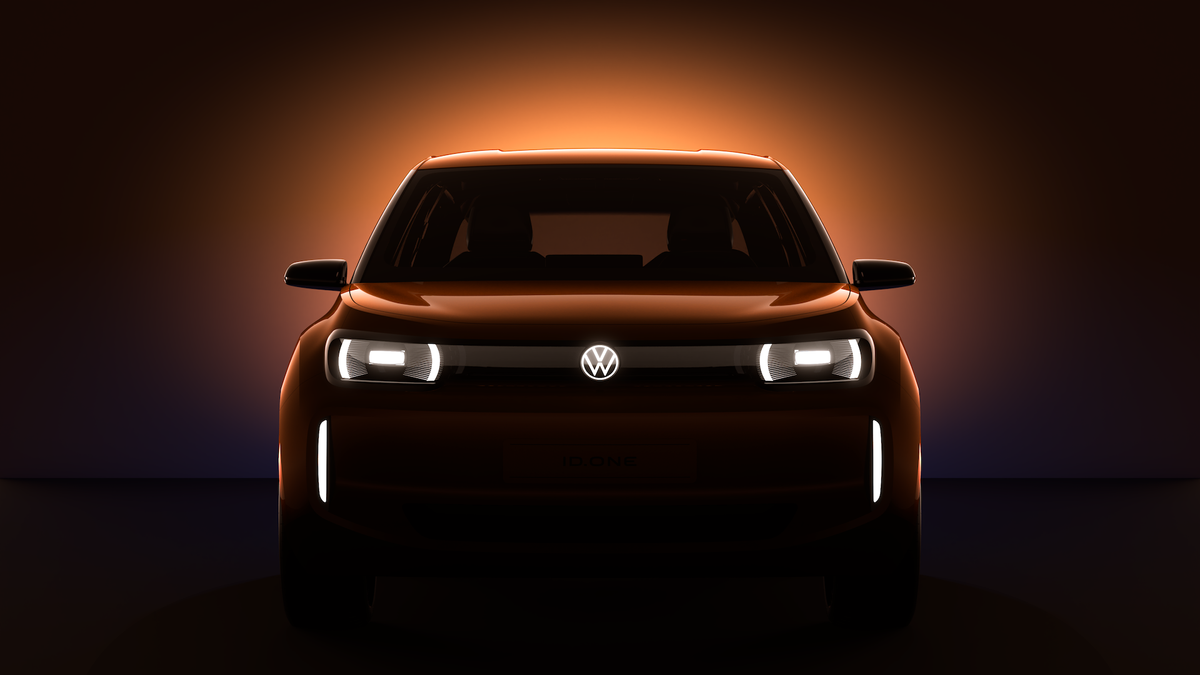- Volkswagen has teased an image of its upcoming entry-level EV
- The new car will kick off the marque’s ID range
- A show car will be unveiled at the end of March
Electric vehicles are typically considered the preserve of early adopters and high earners, but the price of everyday, pure-battery EVs is tumbling – and Volkswagen is the latest to announce the introduction of its most affordable electrified model to date.
Scheduled to go on sale in 2027, we will see a preview of the so-called ID.One in a month or so, with the German marque confirming that it plans to sell the small hatchback for €20,000 in Europe, which is just £17,000 in the UK or around $20,800 / AU$33,000 at current exchange rates.
Solely aimed at European buyers (small cars rarely do well in the US), the new model will sit underneath the upcoming ID.2all (yes, that’s its name) electric car that is planned for next year.
However, the official name hasn’t been revealed yet and we could well see a return of the Up! badge, as this everyday EV has been designed to fill the void that the Up! left, offering “low-cost entry-level mobility” to the masses.
Alongside the ID.2 all, which is expected to cost around €2,000 more, Volkswagen hopes it can turn around some of its patchy EV fortunes with a handful of attractive small cars that the majority of buyers can afford.
The early teaser image looks good, revealing a squat, purposeful front end and clear Volkswagen design cues. The German marque will bring its reputation for quality but spare some of the additional niceties in order to keep production costs down.
As a result, we expect the battery range to be modest, designed primarily with city driving in mind, while the in-car technology could be kept to a minimum.
Speaking to Autocar, Volkswagen technical development boss Kai Grünitz hinted that customers might use their own devices, rather than having “a huge infotainment system”, for example.
Analysis: VW makes EVs affordable, but is it soon enough?
There has been a noticeable shift in the sort of electric vehicles that are coming onto the market in recent months, with larger, more luxurious EV launches becoming far less frequent, as more manufacturers turn towards entry-level models.
In Europe, the Renault 5 E-Tech has captured the imagination of many, scooping numerous awards from industry panels, as well as outselling the Tesla Model Y mere weeks after it was launched in France.
Similarly, Citroen has just announced the new C3 Aircross, which will come with the option of a small petrol engine, but is also offered in a pure EV version that starts at just £22,990 (around $28,500 / AU$45,500).
Below this, the Dacia Spring has been making waves with its ridiculously low £14,240 asking price (around $18,000 / AU$28,600), although Dacia is a brand that isn’t afraid to offer the absolute barebones as it chases affordability.
On the other hand, Volkswagen has a long and successful history of offering entry-level cars that look and feel like more expensive propositions, getting buyers on board at an early age with a view that they will remain VW customers for life.
This €20,000 car has the potential to do what the Polo and Up! have done for the brand in previous decades, but 2027 feels like a lifetime away.
If Renault continues its retro-inspired EV success with the promise of even smaller and more affordable models to come, it could well beat the Germans to it.





